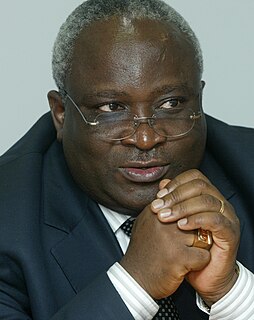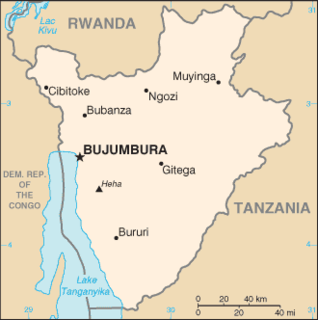| |||||
| Decades: | |||||
|---|---|---|---|---|---|
| See also: | Other events of 1983 List of years in Burundi | ||||
The following lists events that happened during 1983 in Burundi .
| |||||
| Decades: | |||||
|---|---|---|---|---|---|
| See also: | Other events of 1983 List of years in Burundi | ||||
The following lists events that happened during 1983 in Burundi .
The BurundiNational Defence Force is the state military organisation responsible for the defence of Burundi.

Cyprien Ntaryamira was a Burundian politician who served as President of Burundi from 5 February 1994 until his death two months later. A Hutu born in Burundi, Ntaryamira studied there before fleeing to Rwanda to avoid ethnic violence and complete his education. Active in a Burundian student movement, he cofounded the socialist Burundi Workers' Party and earned an agricultural degree. In 1983 he returned to Burundi and worked agricultural jobs, though he was briefly detained as a political prisoner. In 1986 he cofounded the Front for Democracy in Burundi (FRODEBU), and in 1993 FRODEBU won Burundi's general elections. He subsequently became the Minister of Agriculture and Animal Husbandry on 10 July, but in October Tutsi soldiers killed the president and other top officials in an attempted coup.

Domitien Ndayizeye is a Burundian politician who was President of Burundi from 2003 to 2005. He succeeded Pierre Buyoya, as president on 30 April 2003, after serving as Buyoya's vice president for 18 months. Ndayizeye remained in office until succeeded by Pierre Nkurunziza on 26 August 2005.

The Union for National Progress is a nationalist political party in Burundi. It initially emerged as a nationalist united front in opposition to Belgian colonial rule but subsequently became an integral part of the one-party state established by Michel Micombero after 1966. Dominated by members of the Tutsi ethnic group and increasingly intolerant to their Hutu counterparts, UPRONA remained the dominant force in Burundian politics until the latter stages of the Burundian Civil War in 2003. It is currently a minor opposition party.
Pierre Ngendandumwe was a Burundian politician. He was a member of the Union for National Progress and was an ethnic Hutu. On 18 June 1963, about a year after Burundi gained independence and amidst efforts to bring about political cooperation between Hutus and the dominant minority Tutsis, Ngendandumwe became Burundi's first Hutu prime minister. He served as prime minister until 6 April 1964 and then became prime minister again on 7 January 1965, serving until his death. Eight days after beginning his second term, he was assassinated by a Rwandan Tutsi refugee.
Antoine Nduwayo was the Prime Minister of Burundi from February 22, 1995, until July 31, 1996. He is an ethnic Tutsi and a member of UPRONA. He was appointed prime minister by the Hutu president in an effort to stop some Tutsis from fighting with his government. He resigned shortly after the 1996 military coup.

The Kingdom of Burundi or Kingdom of Urundi was a Bantu kingdom in the modern-day Republic of Burundi. The Ganwa monarchs ruled over both Hutus and Tutsis. Created in the 17th century, the kingdom was preserved under European colonial rule in the late 19th and early 20th century and was an independent state between 1962 and 1966.
François Ngeze is a Burundian retired politician. He served as the acting head of state of Burundi from 21 October 1993 to 27 October 1993. He was chosen by the military Committee of Public Salvation, a group of army officers that staged the 1993 Burundian coup d'état attempt overthrew the democratically elected government of president Melchior Ndadaye.

The position of vice-president of the Republic of Burundi was created in June 1998, when a transitional constitution went into effect. It replaced the post of Prime Minister.

The following outline is provided as an overview of and topical guide to Burundi:
Alexis Sinduhije is a Burundian journalist and politician. After founding Radio Publique Africaine during the Burundi Civil War, Sinduhije received a CPJ International Press Freedom Award and was named to the Time 100 list of most influential people. In 2007, he left journalism to run for president, but was arrested in 2008 on a charge of "insulting the president," Pierre Nkurunziza, drawing protests on his behalf from the U.S., U.K., and Amnesty International. He was found not guilty and released in 2009. The film "Kamenge, Northern Quarters" follows Sinduhije before, during, and after his incarceration.

Burundi traditionally had two official languages: Kirundi and French. Of these, only Kirundi is spoken by the vast majority of the population. It is recognised as the national language by the Burundian constitution of 2005.

Burundi, officially the Republic of Burundi, is a landlocked country in the Great Rift Valley where the African Great Lakes region and East Africa converge. It is bordered by Rwanda to the north, Tanzania to the east and southeast, and the Democratic Republic of the Congo to the west; Lake Tanganyika lies along its southwestern border. The capital cities are Gitega and Bujumbura, the latter of which is the country's largest city.
Saidi Tama Nduwimana is a Burundian professional footballer, who plays as a goalkeeper for AS Inter Star in the Burundi Football League.

On 13 May 2015, army general Godefroid Niyombare said that he was "dismissing President Pierre Nkurunziza" following the 2015 Burundian unrest. However, the presidency tweeted that the "situation is under control" and there is "no coup".

On 28 November 1966, Michel Micombero, Burundi's 26-year-old Prime Minister, ousted the 19-year-old king (mwami) of Burundi, Ntare V, in a coup d'état. Ntare was out of the country at the time and the coup leaders quickly succeeded in taking control. Micombero declared an end to the monarchy and the Kingdom of Burundi became a republic with Micombero as its first President.

Burundi–India relations refers to the international relations that exist between Burundi and India. Apart from bilateral relations, India also engages with Burundi through the African Union and the Regional Economic Communities (RECs).

Alain-Guillaume Bunyoni is a Burundian politician who has been Prime Minister of Burundi since 23 June 2020. Before that, from 2015 until 2020, he served as Minister of Internal Security in the Cabinet of Burundi.
Victoire Ndikumana is a Burundian politician for the UPRONA party. She was Minister of Women's Advancement and Social Protection from 1991 to 1993, and Minister of Trade, Industry, Posts and Tourism from 2010 to 2014.
Edouard Nduwimana is a Burundian politician and a former Minister of Home Affairs and Ombudsman of the Republic of Burundi from 2011 to 2016. Nduwimana received an Honoris Causa Ph.D. Diploma in Leadership and Management from London Graduate School and Commonwealth University in 2019.